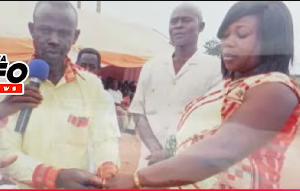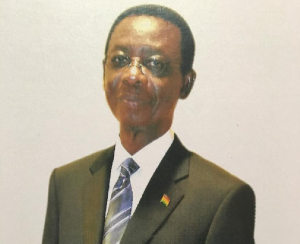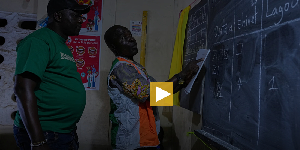My thanks goes to Akosah - Sarpong, Kofi for his thought provoking article on “Poko Frimpong, the Family and Culture” as of late. In fact, in endeavouring to read the said feature article my vision turned blurred and my conjunctivas streaming with tears in response the building up of emotions within my body systems. The use of some tissues by my computer were self - comforting.
It beggars believe that the extended family system of which I belong to is I think, loosing its natural flavour of happiness and joy - to fear, sorrow, envy, doom and peril, that we now witness in our society. The reality is, as Akosah - Sarpong Kofi has pointed out - “…the most dangerous place on earth is the family. The reason is that from your birth to your adulthood, members of your family know everything about you, and can use it either to aid your progress or stifle you”. True or False? The answer in my view, is an affirmative yes!.
Sociologists abundantly informs us that our initial contact with the outside world during the early years of our lives is governed by the family (Primary socialization). I appreciate the work of Talcott Parsons in this vein of thinking for asserting that the family is akin to factories in the building up of our personalities. But, however, there comes a time (during ones natural developmental phase) when one takes control of his/her own life - the socialization effect acquired from the family, peers as well as other members of the extended family (good or bad) then becomes transparent within the extended family and community (Secondary socialisation). This can be a long and painful journey for the individual‘s perceptual set to mature. Interestingly, Social learning theorists - Prof. Albert Bandura supports the view that man’s alternative method of learning effectively through socialisation is by mere observation which he refers to as vicarious learning. The individual could unfortunately learn obnoxious behaviour or attitude from significant member/s within the family as well as from some disgruntled members of the extended family who merely earn daily, their wants through a culture of hate. And, if the situation remains unchecked or unresolved, unfortunate events might occur to some family members who perhaps, cannot even say boo to a goose. The role of the head of the affected extended family cannot therefore be compromised.
To interested reader/s, please spare a minute and try doing this reflective exercise: Think for a moment about your extended family (if it is still a norm in your culture today) which you belong to. Let your mind wander a bit, and try as much as possible to identify any uncomfortable experiences that you or any member of the family might have been through which continues to bother you - for example, that, some of your nieces or nephews no longer regard you as an uncle/aunt because of your political, educational and economic views as opposed to those of their natural parents and you are treated with contempt; that, you suffer from ‘hurts’ of some psychological nature because you have been stigmatised within the said extended family (an unpalatable cultural stink to be tolerated). You are what you are, a naturally rounded being but not what you have been portrayed by some extended family members to be - indeed, by your own ‘blood relations’. Naturally, you feel gobsmacked! Share your reflective experiences with any member of the extended family and you may find this short exercise very useful-thanks!
Let me present an example of widespread philosophical prejudice that I have gleaned from Philosopher Karl Popper in his, INSEARCH OF A BETTER WORLD. Popper eloquently argues that, there is a very influential philosophical view of life to the effect that whenever something happens in this world that is really bad (as in Poko Frimpong’s assassination, for example) or that we greatly dislike, then there must be somebody responsible for it: there must be somebody who has done it, intentionally.















